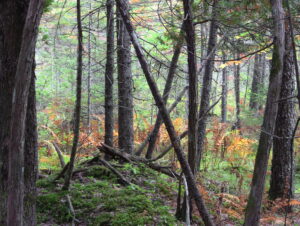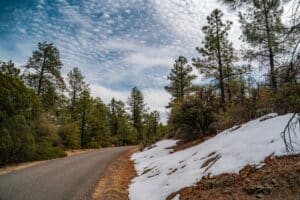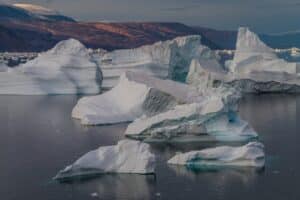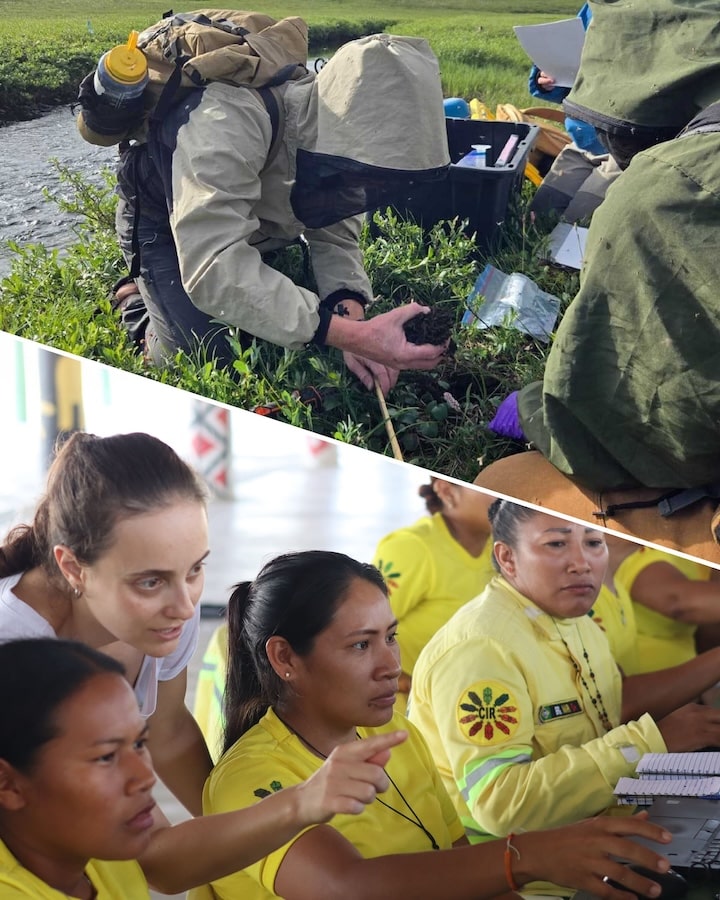Leading ecologists call for strengthening nature-based climate solutions at the Federal level

Nature-based climate solutions (NbCS) have courted both enthusiastic support and considerable controversy (1–8). Defined as deliberate human actions that manipulate ecosystems to improve the planet’s greenhouse gas balance, NbCS provoke disagreement, in large part because their implementation has so far outpaced a science-based understanding of their long-term climate mitigation potential.
Fund for Climate Solutions awards five new grants
From the Arctic to the Tropics, the 2024 winter cohort of FCS projects fills information gaps to produce actionable insights
Quantifying large greenhouse gas emissions from a retrogressive thaw slump in Alaska
Lead: Jennifer Watts
Collaborators: Kyle Arndt, Patrick Murphy
Retrogressive thaw slumps (RTS) are extreme permafrost thaw landscape features, which occur when a section of ice-rich permafrost becomes warm enough to cause the ground ice to melt and soils to collapse. Once they start, RTS continue to expand and destroy nearby permafrost for months to years. Many RTS have been identified, but because they are often in extremely remote arctic locations, very little is known about the potentially substantial carbon emissions from RTS in the form of carbon dioxide and methane. This study will provide the first continuous measurements of carbon emissions from a RTS, collected over at least a year via an eddy covariance tower. The research is also supported by an equipment loan provided through the U.S. Department of Energy AmeriFlux Rapid Response program, which recognized this project as a valuable opportunity to advance science. The data collected will also serve as a “proof of concept” for a subsequent $1.3M proposal to the National Science Foundation for continued research at the site.
Assessing the impacts of ecosystem disturbance on carbon emissions from Arctic and Amazon ponds
Lead: Elchin Jafarov
Collaborators: Zoë Dietrich, Andrew Mullen, Jackie Hung, Marcia Macedo, Kathleen Savage
Freshwater ecosystems are significant sources of the greenhouse gases that persist in the atmosphere and contribute to warming. However, research is lacking an understanding of how disturbances like wildfire and agriculture can change these emissions. This project will address these information gaps by collecting measurements of carbon emissions from ponds, using autonomous floating chambers developed with funding from a previous FCS grant. With this new high-resolution data, the team will unlock the ability to predict year-round greenhouse gas emissions from ponds in the Arctic and the Amazon. Floating chambers will be deployed in ponds in Alaska affected by wildfires, and in agricultural reservoirs in the Amazon-Cerrado frontier. In both locations, the ability to take more frequent measurements of carbon emissions will help researchers improve models and better assess the ponds’ impacts on regional carbon budgets.
The Polaris Project: Data synthesis from almost two decades of research and student participation
Lead: Nigel Golden
Collaborator: Sue Natali
Established in 2008, the Polaris Project has earned global recognition for its leadership in Arctic research, education, and outreach. Through the commitment to providing students with hands-on experience, Polaris has enabled numerous publications and presentations. Polaris is approaching a critical juncture in the next funding cycle, and this project will complete the first-ever comprehensive synthesis of Polaris Project research to help sustain Woodwell Climate’s sole undergraduate research program. By consolidating past research and educational achievements, the team will create a data synthesis paper to be submitted to a peer-reviewed, open-access scientific research journal, as well as a retrospective analysis of undergraduates’ research experiences with Polaris to be submitted to an education research journal. The team will also launch an online communications piece that documents past Polaris participants’ field experiences and unique journeys with a variety of narrative and artistic communications styles and elements.
Determining the climate sensitivity of coastal rivers to guide ecosystem restoration across SE Massachusetts
Lead: Abra Atwood
Collaborators: Marcia Macedo, Chris Neill, Linda Deegan, Scott Zolkos
Coastal rivers, like those that flow into Massachusetts’ Buzzards Bay and Vineyard Sound, are fragile environments that serve critical ecological functions for native fish, downstream estuaries, and coastal wetlands. Different rivers are uniquely sensitive to changes in air temperature based on a variety of characteristics, such as their water source or shade. However, land use changes, including housing development and cranberry bogs, have affected key river characteristics and stream temperatures. This project will investigate MA coastal rivers’ sensitivity to changing air temperature, as well as how that sensitivity is affected by both connection to groundwater and the creation or restoration of cranberry bogs. The temperature sensors and geochemical analyses used in this research may be scalable beyond these rivers and yield insights to inform research approaches relevant to rivers around the world.
A drought early warning system for the DRC: Developing a seasonal forecast based on novel machine learning approaches
Lead: Carlos Dobler-Morales
Collaborators: Christopher Schwalm, Glenn Bush
Seasonal weather forecasts hold immense potential to improve risk management from agricultural failure, water stress, and extreme events. However, significant advances in technical forecasting capabilities remain largely unavailable to communities without the resources to develop or customize them for their region. In 2023, Woodwell Climate Just Access co-produced a national climate risk assessment with the Democratic Republic of Congo’s Ministry of Environment and Sustainable Development. That report identified drought as a major climate threat to the DRC—one which stands to affect almost the entire country. In response, this project will develop a seasonal drought forecasting model tailored to the DRC using cutting-edge machine-learning methods. The forecast will be able to deliver precise rainfall anomaly predictions up to six months in advance for the whole country, and serve as an early warning system to help local people and decision-makers anticipate the impacts of escalating drought risk.
Learn more about the Fund for Climate Solutions.
Study finds lands used for grazing can worsen or help climate change
Too much livestock on a given amount of land can lead to carbon losses, but appropriate numbers can actually help sequester the carbon.

When it comes to global climate change, livestock grazing can be either a blessing or a curse, according to a new study, which offers clues on how to tell the difference.
If managed properly, the study shows, grazing can actually increase the amount of carbon from the air that gets stored in the ground and sequestered for the long run. But if there is too much grazing, soil erosion can result, and the net effect is to cause more carbon losses, so that the land becomes a net carbon source, instead of a carbon sink. And the study found that the latter is far more common around the world today.
Long-term research highlights environmental impact of agriculture
Study carried out in ten micro-basins of the Xingu River, in Mato Grosso

How to reconcile the expansion of agricultural frontiers with the maintenance of the basin landscape and the integrity of the hydrological cycle, which are so necessary for human life? And how does all this have to do with food security? The search for these answers led researcher Márcia Macedo to develop, together with other researchers, a long-term study in ten micro-basins of the Xingu River, in Mato Grosso.
It was through the Tanguro Project, an initiative of the Amazon Environmental Research Institute (Ipam) in the city of Querência, that the researcher found the perfect environment to develop her first experiment in search of these answers. In an open-air laboratory, which brings together researchers from several countries, Márcia also had access to watercourses located on land with different uses. “It’s a place where we can compare forested basins, that is, integral ones, and basins with intensive agriculture. So we researched four basins for forestry and six basins for agriculture,” she explains.
Scientists from Woodwell Climate Research Center are among the 195 leading experts in forest ecosystems, climate change, and the carbon cycle who have come together to urge the Biden Administration to immediately declare a moratorium on all logging in mature and old-growth forests on federal lands. The signers include seven members of the National Academies of Sciences and some of the most notable names in climate science.
The letter comes amid growing concerns within the scientific community around the U.S. Forest Service and Bureau of Land Management’s response to an executive order, issued by the Biden Administration on Earth Day 2022, to establish guidelines and best practices to safeguard mature and old-growth forests on federal lands. The letter was initiated by Dr. Beverly Law, Professor Emeritus at Oregon State University, and Dr. Bill Moomaw, Professor Emeritus at Tufts University and Distinguished Visiting Scientist at Woodwell Climate. Last week, Woodwell Climate Senior Scientist and signatory Dr. Rich Birdsey delivered the letter’s message to the Mature and Old Growth Science Summit, hosted by the Forest Stewards Guild, the U.S. Forest Service, and the Society of American Foresters.
“Old-growth forests are made up of our oldest, and typically largest, trees that store massive amounts of carbon,” said Dr. Rich Birdsey. “We need to protect old growth, as well as younger mature forests that can attain old-growth characteristics with time.”
“The carbon storage function these forests play is essential to our efforts to reduce carbon emissions and mitigate the impacts of the rapidly changing climate, yet millions of acres of mature and old-growth forests stand on federal lands that are vulnerable to logging,” said Dr. Beverly Law. “To align with the United States’s commitments to ending global forest deforestation and degradation, we must urgently halt any additional logging of these critical natural resources.”
The scientists point to recent efforts by the agencies to increase timber sales and logging of these forests rather than increasing their protection as directly contrary to these objectives, and call on President Biden to issue a new executive order prohibiting activities that further forest degradation in the short-term, while the Administration works, in partnership with policy and climate leaders, to develop and implement effective, long-term management policies. Reducing timber harvesting of carbon-dense forests can have an immediate effect of lowering emissions and is the most significant action that the U.S. can take to immediately limit greenhouse gasses.
“With their 2022 executive order to protect mature and old-growth forests, the Biden Administration laid the groundwork for the U.S. to emerge as a global leader in conserving these forests and making good on international climate commitments,” said Dr. William Moomaw. “Halting logging in the interim is necessary to protect these resources now, while also working with the agencies to develop strong, long-term policies consistent with the Administration’s commitments to addressing climate change and safeguarding forests as a natural climate solution.”
The full letter can be found here.
Last month was hottest February ever recorded. It’s the ninth-straight broken record

For the ninth straight month, Earth has obliterated global heat records — with February, the winter as a whole and the world’s oceans setting new high-temperature marks, according to the European Union climate agency Copernicus.
The latest record-breaking in this climate change-fueled global hot streak includes sea surface temperatures that weren’t just the hottest for February, but eclipsed any month on record, soaring past August 2023’s mark and still rising at the end of the month. And February, as well the previous two winter months, soared well past the internationally set threshold for long-term warming, Copernicus reported Wednesday.
Continue reading on Associated Press News.
Study pinpoints links between melting Arctic ice and summertime extreme weather in Europe
New research shows how last year’s warming melted ice in Greenland that increased flows of fresh, cold water into the North Atlantic, upsetting ocean currents in ways that lead to atmospheric changes.

The Arctic Ocean is mostly enclosed by the coldest parts of the Northern Hemisphere’s continents, ringed in by Siberia, Alaska and the Canadian Arctic, with only a small opening to the Pacific through the Bering Strait, and some narrow channels through the labyrinth of Canada’s Arctic archipelago.
But east of Greenland, there’s a stretch of open water about 1,300 miles across where the Arctic can pour its icy heart out to the North Atlantic. Those flows include increasing surges of cold and fresh water from melted ice, and a new study in the journal Weather and Climate Dynamics shows how those pulses can set off a chain reaction from the ocean to the atmosphere that ends up causing summer heatwaves and droughts in Europe.
Read more on Inside Climate News.
How poop turns into forests
Did you know the world’s largest tropical forest is partly formed by seeds emerging from poop? Ecologist Ludmila Rattis reveals the surprisingly fruitful benefits of letting nature take care of its own business, sharing how the digestive habits of tapirs — pig-like creatures that roam Amazonia — spread seeds that help regenerate the forest and promote climate resilience worldwide. (Even nature’s waste is put to good use!)




